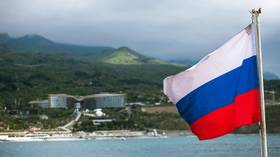Sanctions against Russia to remain no matter what – foreign policy expert

The extensive sanctions placed on Moscow will most likely remain in place even if there is a ceasefire or a political resolution to the Ukrainian conflict, one of Russia’s leading foreign policy analysts, Ivan Timofeev, has told RT. The expert was speaking on the sidelines of the Saint Petersburg International Economic Forum on Friday.
Timofeev, who serves as the program director at the Kremlin-backed Valdai discussion forum, argued that the EU was a “huge vessel” that was very difficult to turn, and that because it had already “turned away from Russia,” it was difficult to imagine that things could ever go back to the way they were before February 2022, when Moscow launched its military offensive against Ukraine.
According to Timofeev, the sanctions have also not yet taken their full effect. While Russia is still feeling “quite good” as oil prices have risen, Timofeev notes that it could still only be a matter of time before Moscow is faced with problems, unless it redirects its attention to markets in Asia, especially countries like India and China.
Gas, meanwhile, is a “completely different” subject, says the expert, since Europe can’t easily get rid of Russian gas as it has little means of getting it elsewhere and lacks the technical capabilities of receiving liquefied gas from countries like the US. Nevertheless, Timofeev stressed that Moscow should still think about “strategic decisions of redirecting our gas supply on the international markets,” as “policy and politics will press the economy in the nearest future.”
After noting that energy cooperation between Russia and the West will likely be complicated for quite some time, Timofeev also stressed that food security has become an issue as international businesses are afraid of engaging with Russia.
“Food security is an interesting issue,” noted Timofeev. “In relation to Russia, sanctions are formally not covering the Russian exports of food. Formally – this is a keyword. The US Department of Treasury has even issued a general license which allows businesses to conduct financial transactions even with sanctioned Russian persons if these transactions are related to food security – to grain or any other kind of food. However, businesses are very scared. Businesses are convinced that it’s easier to completely abandon dealings with Russia as such, rather than face the enforcement of secondary sanctions from the US.”
Timofeev highlighted two major problems with the export of Russian grain – the decline of financial transactions related to Russian grain exports, and the refusal of vessel owners to transport the grain to countries like Egypt over the perceived threat of American sanctions.
The specialist noted that this has all resulted in a “paradoxical situation,” where the US Treasury is trying to encourage businesses to engage in the export of Russian grain, saying “It is legal, you can do this,” but the businesses, looking at past experiences with US sanctions, are choosing to abstain.
Timofeev concluded by stating that the current economic crisis has shown that Russia is actually quite an important player in the international economy.
“Before this crisis there had been numerous assessments that the Russian economy is almost nothing in the global landscape because the percentage of Russia in the global GDP is quite tiny, less than two percent,” he said. “But, at the same time, if you look at the reality, Russia is [the] number 11 economy. But what is more important is that Russia is critical in a number of spheres – in energy, agriculture, food, arms supplies, and a number of tech chains and supply chains.”
In the end, the fallout from the West’s sanctions against a seemingly inconsequential country like Russia, according to Timofeev, turned out to be much bigger than “their linear logic had implied before.”
However, while the international economy will eventually get through this crisis, Timofeev surmised, it’s important to understand that the current issues are the result of the “accidental combination” of a multitude of factors and not solely the result of the ongoing conflict between Russia and Ukraine.













